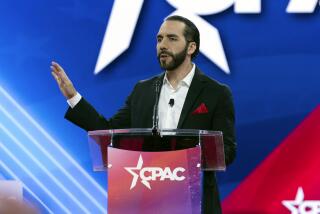Obama seeks to turn the tables in Ohio and Texas
With the Democratic presidential race about to enter another crucial phase of voting, Barack Obama has launched a newly aggressive strategy to undermine two pillars of support for rival Hillary Rodham Clinton: Latinos and working-class white voters.
Each is an important constituency in major March 4 primaries -- Latinos in Texas and blue-collar workers in Ohio -- which many believe Clinton must win to keep her White House hopes alive.
In Ohio, Obama backers are courting local union leaders and members with promises that the Illinois senator will change U.S. trade policies enacted by Clinton’s husband, and which the unions blame for severe job losses.
In Texas, Obama has launched a new effort to introduce himself to Latino voters as someone who understands their challenges, thanks to his background of attending college on a scholarship and working with churches as a community organizer.
Obama has also launched a new organizing campaign in the Rio Grande Valley of South Texas. One piece of that effort could be glimpsed at a Saturday-night celebration of a new Obama office in downtown Brownsville, about half a mile from the Mexican border. It drew about 200 supporters, a noteworthy crowd, the campaign said, for an event not attended by the candidate.
Latinos and blue-collar whites were largely elusive for Obama in the primaries and caucuses held so far. Clinton strategists believe the two groups form a natural base of voters for her that will carry her to victories in delegate-rich Ohio and Texas.
But exit polls from some of the most recent voting states, such as Virginia and Maryland, show that Obama has begun to narrow the gap not only with Latinos but with lower-income whites, who have been among Clinton’s most loyal backers.
Youth appeal crucial
Now, the Obama strategy is to peel away as much of that base as possible, helping him to either win Ohio and Texas outright or at least split the states’ delegations to the national nominating convention.
“This is, or it was, Clinton country,” said Michael Rodriguez, 40, a Brownsville lawyer who helped open the Obama office here and now serves on the campaign’s local steering committee. “We’re finding people who were Clinton supporters and making them Obama supporters.”
In going after both groups, Obama’s appeal to younger Americans is proving important.
Union officials say that a push from younger members helped persuade the Service Employees International Union and the United Food and Commercial Workers to endorse Obama last week. Both unions plan to be active in the campaign, making personal contact with their membership on behalf of Obama.
About 40% of the food union’s members are younger than 30 years old, and their enthusiasm helped move the union out of neutrality and toward an endorsement, said union president Joe Hansen. “Barack Obama did something to our members and to our leadership,” Hansen said.
In Texas, Obama is trying to take advantage of an emerging generational divide to bring more Latinos to his side.
Nowhere is that more pronounced than in Brownsville, where longtime state Sen. Eddie Lucio Jr. was an early endorser of Clinton and escorted her last week during a visit to the region. But Lucio’s 29-year-old son, newly elected state Rep. Eddie Lucio III, is a top Obama organizer -- even though he grew up looking at family photos of his parents and grandparents with the Clintons.
“That was his generation . . . but this is my generation,” said the younger Lucio. “This is the most exciting time for me ever other than my own campaign. Someday I can tell my grandkids that I worked on the Obama campaign, and they will be like, ‘Wow.’ ”
One of two ads that Obama is airing in Latino radio markets in Texas is pitched explicitly at younger Latino voters. “Obama is talking to me,” it says, “about the opportunity to go to college, and about ensuring my parents and grandparents have the healthcare they need. That’s why I’m talking to others -- my parents, my uncles, and my friends” about supporting Obama.
Some local Obama backers say they have begun to see the Illinois senator, the son of an African father, as someone who can relate to the Latino experience.
‘Kick the door off’
“I see more of myself in Barack than I do in Hillary,” said Sergio Zarate, 46, who owns a chain of dry cleaning stores in the Rio Grande Valley and attended Saturday’s party. “He’s not just going to crack a glass ceiling. He can really kick the door off its hinges, and clear the way for all of us, even Hispanics.”
Clinton has also begun running radio and TV advertisements in Spanish, and she made several appearances in the area last week.
Clinton backers predict that her connections here will negate the Obama efforts. The local Democratic Party chairman in Brownsville, Gilbert Hinojosa, is backing Clinton and said she could win 70% of the vote here -- simply because voters “remember eight years of Bill Clinton.”
Hinojosa said he was impressed by the turnout at the opening of Obama’s Brownsville office, but he added: “We’ll do something better.” Clinton is scheduled to come after the Tuesday primaries in Hawaii and Wisconsin.
For Obama, campaigning to be the first black president, making big gains among Latinos would be a major achievement. In California, Clinton defeated him among Latinos by almost 2 to 1.
Texas advantages
Obama aides argue that they enjoy more advantages in Texas, where Latinos and blacks have a history of building political coalitions. Former Dallas Mayor Ron Kirk, an African American who is advising the Obama campaign, won about 70% of the Latino vote in his mayoral runs. He also carried the heavily Latino Rio Grande Valley as a U.S. Senate candidate in 2002, though he lost that race.
Moreover, Obama strategists say Texas Latinos tend to be more politically independent than those in other states, having voted in large numbers for George W. Bush in his races for governor and president. This suggests they may feel comfortable severing their historical ties to the Clinton camp, the Obama aides say.
Obama has one other advantage in Texas: The state’s complicated system of voting, involving both a primary and a caucus, awards convention delegates based in part on past voter turnout in state Senate districts. Because blacks in cities such as Houston and Dallas have voted at a higher rate than Latinos in the valley -- and blacks are expected to go heavily for Obama -- those black voters will have outsized influence over the final delegate count.
On some of the most important points of policy, little distinguishes Obama and Clinton. Both voted in favor of funding a fence along the Mexican border -- an unpopular stance in Brownsville, a community that boasts close commercial and social ties with Matamoros, its Mexican sister city directly across the border.
Obama and Clinton also share a similar voting record on trade, an issue of high importance to many voters in Ohio. Both opposed the Central American Free Trade Agreement and supported a trade deal with Oman, a country on the Arabian peninsula. They also both say trade deals should require countries to protect worker rights and the environment.
Retooling NAFTA
Both also say they favor reworking the North American Free Trade Agreement.
Still, Obama’s strategy is to try to make NAFTA a central issue of the campaign and to try to draw contrasts on the issue with Clinton.
Many union voters believe that NAFTA was responsible for encouraging companies to send U.S. jobs abroad.
“Hillary Clinton believed NAFTA was a ‘boon’ to our economy,” said one flier that the Obama campaign mailed to Ohio voters last week. A bleak-looking, abandoned factory was pictured on the mailing.
“We are going to mention NAFTA on every occasion,” said one top Obama advisor, who asked that his name not be used.
Obama’s claim that Clinton called NAFTA a “boon” to the economy is based on a 2006 item in the New York newspaper Newsday.
In that item, Clinton did not use the word “boon.” Rather, the newspaper used that word to characterize her position in a chart accompanying a news story.
Clinton and her influential labor and political allies in Ohio called reporters Friday to denounce the Obama brochure as including “false claims” about her record on NAFTA. Her staff cites evidence that she privately argued against NAFTA inside the Clinton White House in the early 1990s and that she consistently called for improvements in the trade deal since her arrival in the Senate.
Still, some perceive Clinton as being too supportive of NAFTA. David Caldwell, an official of the United Steelworkers of America in Ohio, said that “Barack Obama is a little vague on this issue. But the Clinton position has been clear, at least in the past. And it was clearly wrong.”
One longtime union activist, Harry Thomas, 59, a member of the International Union of Painters & Allied Trades in Akron, was traveling the state cheering for Clinton last week. “I’m tired of hearing about it,” Thomas said of the Obama campaign’s complaints about Clinton and NAFTA. He said he thought Clinton would win the state but acknowledged he was uncertain.
“This is a hard-fought contest,” he said.
Wallsten reported from Brownsville, Texas, and Hamburger from Columbus, Ohio.
More to Read
Start your day right
Sign up for Essential California for news, features and recommendations from the L.A. Times and beyond in your inbox six days a week.
You may occasionally receive promotional content from the Los Angeles Times.






